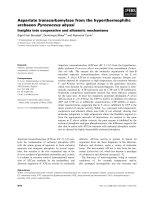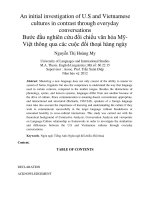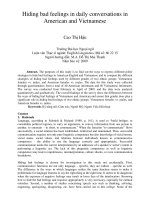Semantics Cooperative and conversations
Bạn đang xem bản rút gọn của tài liệu. Xem và tải ngay bản đầy đủ của tài liệu tại đây (1.09 MB, 71 trang )
SEMANTICS
Week 8:
Conversation
and Co-operation
Week 8
Conversation and co-operation
Group 8 (K18B)
1. Pham Thanh Huyen (88)
2. Pham Thanh Huyen (86)
3. Ngo Thu Huyen
4. Do Kieu Lan
5. Tran Thi Khuong Lien
6. Nguyen Thi Mien
7. Nguyen Thi Ha My
8. Nguyen Thi Hoang My
9. Cao Thi Huyen Nga
10. Nham Thi Thanh Ngan
11. Nguyen Thi Hien (K15B)
Instructor:
Dr. Ha Cam
Tam
NGO THU
HUYEN
By saying A -> one means A
Do you
love me?
Yes,
I do.
By saying A -> one means B
Who
else?
Do you
love
me?
Adam
Eva
Conversation and co-operation
1. Grice saw communication as governed by a cooperative principle
2. A number of maxims follow as a result of assuming the cooperative
principle
3. The CP and maxims can be used to explain a number
1.2.of features
2.1
Definition
of
maxims
1.1.
of communication
Cooperative
Implicature:
principle
decode and
Category
maxims
4. There are a number2.2.
of problems
withofthe
Gricean approach.
infer
3.1.
5. Conclusion
Basic outline
Maxims
of the Gricean
of
approach to
6. Reference
Quantity
pragmatics
Maxims
of
Quality
3.2.
Maxim
Maxim ViolationMaxims
of ( + Exercises)of
Relation
Manner
CAO THI
HUYEN
NGA
Conversation and co-operation
1. Grice saw communication as governed
by a cooperative principle
1.1. Implicature: decode and infer
1.2. Cooperative principle
Conversation and co-operation
1.1. Implicature: decode and infer
Example:
How do you think
that Jack works out what Lily means?
Jack: Did you
enjoy Animal
Farm?
Lily: I only
like detective
stories.
Why doesn’t
Jack just stick
with what Lily
has actually
said—
why doesn’t
he assume
that Lily is
simply telling
himWHY?
that she
only likes
detective
stories?
How do
you think
that Jack
works out what
Lily means?
+ How is it
HOW?
that he
actually
works out
what this
further bit of
meaning is?
Why doesn’t Jack just stick with what Lily has
actually said?
Lily
I only like
detective
stories
Jack
Oh, she
only likes
detective
stories
Why doesn’t Jack just stick with what Lily has actually said?
Jack:
- assume
Lily is obeying
Certain
standards:
what she’s
saying
meet his
expectations
in
some way s.
If the
obvious
meaning
not meet
he
knows
he’s got to
look a bit
further
Lily’s saying
she only
likes detective
stories
realises
this isn’t
relevant
to him
he looks
for some
further bit
of meaning
WHY?
How do
you think
that Jack
works out what
Lily means?
HOW?
PHAM THANH
HUYEN (88)
How is it that he actually works out what this
further bit of meaning is?
Process
WhatLily
Lilysaid
said
What
Lily
Lily
Only
Only
likes
likes
detective
detective
stories
stories
Jackknows
knows
Jack
that
that
AnimalFarm
Farm
Animal
not
isisnot
detective
aadetective
story
story
Therefore
Therefore
Lily
Lily
doesn’t
doesn’t
Like
Like
AnimalFarm
Farm
Animal
decod
e
JACK
infer what
she means
or what she
is implying
what Lily
has said
implicature
Utterance interpretation was not just a
matter of decoding, but also a matter
of inference.
Moreover, that it was a matter of
inferring the intentions of others
Grice’s first insight was that
there might be some general
principles behind how hearers
retrieve these implicatures.
communication is
a cooperative
activity
TRAN THI
KHUONG LIEN
1.2. Cooperative principle
Cooperative principle is known as a basic
underlying assumption we make when we
speak to one another is that we are trying
to cooperate with one another to construct
meaningful conversations.
- The cooperative principle goes both ways:
Hearer
assume that
speakers are
observing it
Speaker
observe the
cooperative principle
Speakers tend to behave in certain
predictable cooperative ways that
hearers can then use the assumption that
speakers are behaving cooperatively as a
key part of the process of utterance
interpretation
they can use it as a premise in a process
of logical reasoning or inference.
- What are these predictable ways in which
cooperative speakers behave?
- What counts as being cooperative?
Grice’s answer to this question is that
speakers follow a general cooperative
principle which can be broken down into a
number of different maxims of
conversation, which fall into four basic
categories
1.
Grice saw communication as governed by a cooperative principle
2. A number of maxims follow as a result of assuming the cooperative
principle
3. The CP and maxims can be used to explain a number of features of
communication
4. There are a number of problems with the Gricean approach.
5. Conclusion
6. Reference









